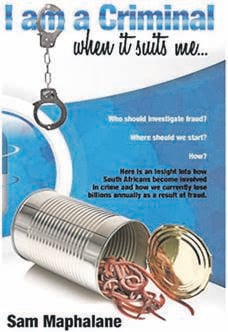
The turf war between medical schemes and healthcare practitioners with regard to who should be investigating alleged unethical billing practices and other fraud and abuse in the private healthcare industry is widening, with a former private sector forensic fraud investigator adding members to the dispute – accusing them of also being complicit and of being “huge drivers of fraud”.
Samuel Maphalane (pictured), a certified ethics officer and speaker on fraud and ethics management, launched his self-published book this week, titled I Am a Criminal When it Suits Me’. In it, he explores the little-considered phenomenon of medical aid scheme members being part of an illicit web of fraud, waste and abuse reportedly costing the private health sector R22 billion annually.
Last week, City Press reported on the section 59 investigation into allegations that black and Indian doctors were being unfairly treated and targeted by medical schemes.
Various presentations were made at the section 59 hearings about claims for services being withheld from the practitioners “arbitrarily”, in many instances based on their ethnicity and the colour of their skin.
One submission after the next told of how these doctors were allegedly being railroaded by schemes through so-called forensic probes, were made to sign acknowledgment of debt letters totalling huge amounts and, in some instances, were even blacklisted.
This week, Kgosi Letlape, president of the Health Professions Council of SA, who has recently slammed such unethical practice, again attacked the private medical scheme industry. He did so at the event on Thursday marking the official release of the National Health Insurance Bill, calling the sector a “mafia land” that victimised practitioners.
Maphalane – who worked at the SA Police Service Medical Scheme (Polmed) for more than 15 years – has also made a submission to the section 59 hearings, saying in his experience of conducting forensic probes for the scheme, members were routinely shown to be not so squeaky clean.
He makes the disclaimer that his book is not meant to be taken as a comprehensive study of the industry, but rather, as a narrative of his own experience.
“When I started working in the medical field, I did investigations and saw the kinds of crimes that involved mainly members. I saw the need to write a book that can be distributed to members to highlight the problem, since they themselves have been so involved in fraud and corruption together with healthcare providers,” Maphalane said.
“I feel that the problem will never be solved unless it is exposed and dealt with as a crime. I believe the book will help members understand that by being part of the fraud, they are actually stealing from themselves because medical aids are wholly owned by them, but they are not told this.”
In the book, Maphalane tells of how, in many cases, members were in cahoots with practitioners such as pharmacists, who would give them cash and then, in exchange, claim the medication on a fake medical script from the scheme.
In other instances, Maphalane writes about members who fudge doctors’ scripts for baby medication, allegedly routinely using these to shop for nappies and baby milk formula instead.
The most lucrative fraudulent behaviour of all, he writes, is admitting members to hospital who are not sick in order to claim from hospital cash-back plans. In this regard, Maphalane recounts his experience of having visited a hospital in KwaZulu-Natal, after it received a tip-off about a scam where both doctors and patients were involved in fake admissions.
“At the hospital we were inspecting, it was said that people came to the ‘hotel section’. Apparently, the section was known as one where the people were not sick, but where they came to generate the required days to be able to get money from hospital cash plans,” he writes.
“All who matter know about it, but they do very little to solve it. It’s discussed at meeting after meeting and forum after forum … one person would have up to five different hospital cash plans, and on being discharged for one admission, they could easily walk away with R100 000.”
He also tells of members getting fake sick notes from doctors and of the rampant fraud that occurred in earlier years for spectacles and optical frames, whereby members would purchase popular brands of sunglasses at pharmacies and claim for them from the medical aid, instead of undergoing proper eyecare procedures and buying the scripted spectacles.
A claim made by various practitioners at the section 59 hearings was that schemes employed former police officers to conduct raids and probes on their offices. Maphalane agrees, saying this was effected by at least two of the contracted companies which conducted forensic audits for the medical schemes – because of the often dangerous and hostile environment investigators met when visiting doctors’ practices.
While practitioners have not denied that there are rogue professionals, they argue that such fraudsters be reported to SAPS rather than schemes taking it upon themselves to be “prosecutor and judge”, using vigilante fraud units.
The book costs R200 and is available at Skoobs Theatre of Books in Montecasino




 Publications
Publications
 Partners
Partners








